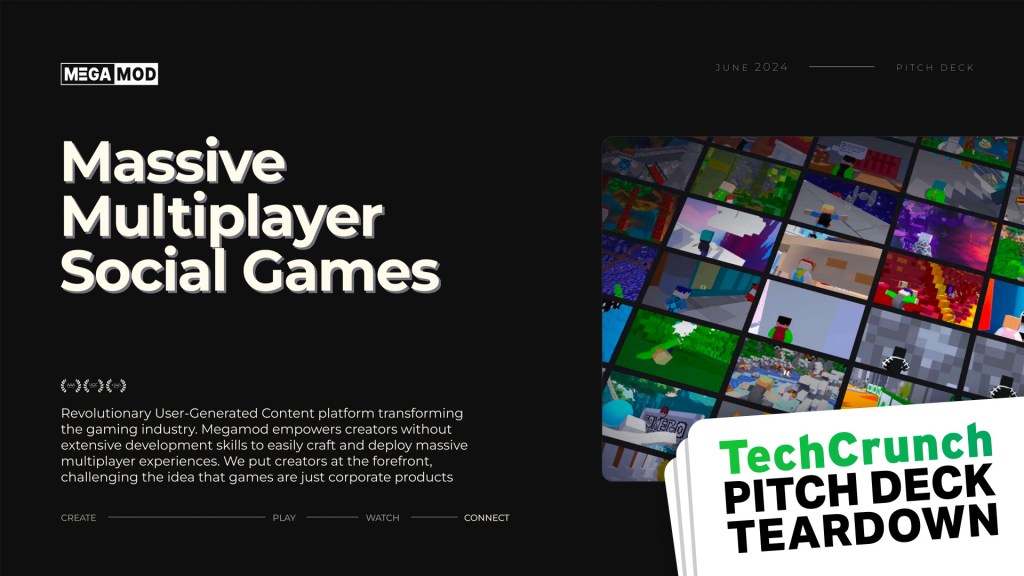Welcome to our 100th pitch deck teardown! This week, I’m taking a look at MegaMod’s seed-stage pitch deck. MegaMod seems to be the latest darling of the gaming industry and just pocketed a cool $1.9 million, bumping its post-money valuation to $27 million. With a mission to revolutionize the game creation process, MegaMod says it plans to splurge on refining its go-to-market strategy and testing out its retention and monetization model.
In an industry where creators are often tossed aside like yesterday’s lootboxes, MegaMod swoops in with a heroic promise to put them front and center — a knight-in-shining-armor vibe that is slightly sullied by the very first screen on the company’s website.

So, what’s the real story behind MegaMod’s pitch deck that charmed investors and secured that $1.9 million? We’re about to dive deep, peeling back the layers of this pitch to see if it’s a critical hit or just another NPC in the startup landscape.
We’re looking for more unique pitch decks to tear down: Here’s how you to get involved. Read all our 100+ Pitch Deck Teardowns here.
Slides in this deck
MegaMod’s pitch deck clocks in at a tight 13 slides. That’s fewer than we typically expect, but who are we to judge? Oh, wait, judging is literally the point of these articles. Never mind, let the judging commence.
- Cover slide
- Problem slide
- Product portfolio slide
- Product Overview slide
- Product slide 1
- Product slide 2
- Product slide 3
- Product slide 4
- Value proposition slide
- Traction slide
- Financial projections slide
- Team slide
- Ask and Use of Funds slide
Wow, four product slides? I can almost guarantee that investors don’t care this much about your product. OK, fine. Let’s get started.
There’s one thing to love about MegaMod’s pitch deck
Dedicating 29% of a pitch deck to product slides isn’t great, and it’s clear that the rest of the deck isn’t that great either. But there is one thing that is.
A bold ambition

Generation Z treats gaming like it’s a religion, not just a hobby. They’re glued to their consoles, VR headsets and mobile screens, diving into digital worlds with the kind of dedication usually reserved for cult leaders. This generation doesn’t just play games, though; they’re building entire universes, forming guilds and trash-talking their way to the top of leaderboards. Gaming isn’t just something they do; it’s who they are — and despite all of this, making games is hard.
Is that a problem? I have no idea. I kind of always assumed that making games was hard, but MegaMod seems to place a different bet: The company makes it clear that through its full suite of products, it’s making it stupidly simple for these gaming fanatics to create their own games. It’s an interesting bet, banking on Gen Z’s insatiable thirst for self-expression and DIY attitude. Why just play games when you can build them?
I love a slide that makes me question base assumptions, and this slide did that. Wait, why does it seem so hard to build games? Can games built in a day be any good? I reserve judgment, but I can’t help but admit that I’m curious!
Three things that MegaMod could have improved
I wrote a few of drafts of this paragraph in which I tried to find a silver lining, but in a nutshell: I can’t believe this company managed to raise a cent, let alone a respectable chunk of change.
The pitch deck reads like a ransom note scribbled by someone who forgot their glasses. Vital information? Missing in action, and what little info they do provide is flimsier than wet tissue paper. I’ve seen college entrepreneurship pitch decks with more substance.
Based on this deck alone, it’s a miracle anyone invested at all, which probably points to the fact that the company has something else going for it. I’m struggling to see what, though. Either it has some serious charm or its investors have a wild sense of humor.
It’s likely that there’s something to the company that doesn’t come through in the deck. Either the founders know the investors, or there’s a piece of traction or a go-to-market mechanic that isn’t explored in the deck. But that’s the fun thing about this series: I’m not talking to investors or founders; I’m critiquing the deck based on what is there, especially because a pitch deck should be able to stand on its own.
What the hell is going on with this product?

Slides 4-8 of MegaMod’s pitch deck are an exercise in being overly ambitious, making even the most seasoned entrepreneurs cringe. Instead of focusing on a single product or even a couple of well-developed offerings, MegaMod has decided to throw everything at the wall to see what sticks. Six products, including a game engine, AI coding tools, a skins editor, a prop editor, an in-game library and a social platform. And if that wasn’t enough, they’ve got a marketing tool (MegaGames), tools for streamers, distribution tools and more. It’s as if they went on a shopping spree at the tech store and decided to buy one of everything, just in case.
Here’s the thing: Startups need focus. Spreading yourself thin across so many product lines is a recipe for disaster. Any single one of these products — be it the game engine, the AI coding tools or the social platform — could be fully viable startups on their own. Each requires dedicated resources, specialized knowledge and a clear strategy. Instead, MegaMod is trying to juggle all these balls at once, and it’s hard to see how it won’t drop a few — or all — of them. The lack of a focused approach screams hubris more than it does competence.
One could argue that combining all these tools into a single suite might leverage network effects, creating a cohesive ecosystem that’s greater than the sum of its parts. But here’s the kicker: The deck doesn’t make that argument. At all. We’re left guessing at how these disparate products should interact, let alone how they’ll generate revenue. It’s unclear what the monetization model is for any of this. Is the company banking on subscriptions, one-time purchases, ads or some magic beans? Without a clear path to profitability, MegaMod’s grand vision feels more like a pipe dream than a solid business plan. Investors are left with more questions than answers, and that’s a surefire way to keep the funding at bay.
Where’s your traction?!

MegaMod boasts having 2,500+ creators who have churned out an impressive 65,000+ games. On the surface, these numbers seem promising, but on second glance, they feel deliberately opaque, as if the company is trying to distract us with volume rather than substance. If the average creator has made 26 games (wow!), we need to ask some critical questions. Who is playing these games? Are they any good?
A large number of creations doesn’t mean much if the games aren’t engaging players or generating revenue. Without knowing the quality and popularity of these games, it’s hard to assess the actual impact MegaMod is having in the gaming community. I guess the best comparison I can come up with is this: The average three-year-old is probably making 26 paintings per quarter. But their revenue is going to be incompatible with a venture-scale business.
The next slide projects an ambitious $170 million in ARR by 2028, which is great, but there’s a glaring omission: current revenue numbers. What’s the average revenue per player right now? How is MegaMod generating income now, and why are those details absent? It’s easy to make lofty projections, but investors need to see a track record of growth and current financial health to believe in such an aggressive forecast. Without these key metrics, the projection feels more like wishful thinking than a realistic business plan.
Another red flag is the source of these users. The Use of Funds slide (slide 13) claims “viral expansion and product-led growth” as the company’s growth strategy, but that’s about as vague as it gets. What does that mean? Where are the users currently coming from? How is MegaMod driving traffic and engagement? Terms like “viral expansion” sound great in theory but require concrete strategies and evidence of past success to back them up. Truly viral companies are excessively rare. This lack of clarity is frustrating and does little to inspire confidence in the company’s ability to scale effectively.
Overall, the traction slide lacks real business metrics, raising serious concerns about the founders’ understanding of their business. If I were a board member, I’d be grilling them hard on what metrics they track, why they think those are important, and what specific actions they take to move those metrics. Without clear, actionable data, it’s difficult to gauge the true health and potential of the company. Investors need transparency and precision, not smoke and mirrors.
Could the team be any more vague?
I know, I know. I whine about the team slide in almost every one of these pitch deck teardowns. And — this is a promise, not a threat — I’ll keep doing it until people start making better team slides.
The team slide for MegaMod presents a group of individuals with promising descriptions, but the details are frustratingly vague:

This slide is your golden opportunity to name-drop the blockbuster games you’ve worked on, the startups you’ve founded, or the hyper-growth successes you’ve spearheaded. Instead, MegaMod offers murky statements that feel more like placeholders than concrete achievements. Specific company names, numbers (revenues and results) and facts are critical here. Without this, the descriptions come across as hollow and unconvincing.
- “Experience of building a $20m sales business.” Great! Which one?
- “Revenue up to $8 billion?” Holy cow, that’s impressive. But for which business?
- “Experience of building a business for >80m users.” Yes! I want to invest in that! Show me the receipts!
- “Launched 100+ mobile games.” Name one! Maybe two!
- “Experience with 150M combined audience.” Cool. Which audiences? Who are they?
The vague claims almost feel like they’re trying to hide something, like team members have signed NDAs with their previous employers and are skirting around the details. This kind of opacity is a huge red flag and suggests one of three things: a lack of significant accomplishments, a deliberate attempt to obfuscate the truth, or just a failure to figure out what investors need to know to make an investment.
The only logical conclusion is that this team must be such epic rockstars that I’ll look like a total buffoon for not recognizing them. But seriously, come on. If these vague boasts were true, turning this slide into an absolute slam dunk would have been a piece of cake.
The full pitch deck
If you want your own pitch deck teardown featured on TechCrunch, here’s more information. Also, check out all our Pitch Deck Teardowns all collected in one handy place for you!































Comment